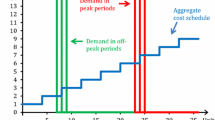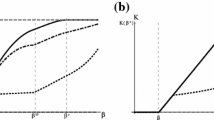Abstract
The paper highlights and analyzes the tension between designing power sale agreements that reduce uncertainty for the private investors and running the power systems as more efficiently as possible in the restructured electricity market. The features of such agreements are preliminary in resolving this tension and, therefore, in orienting the development of electricity markets restructuring towards a competitive direction. We define a theoretical contractual model, highlighting the tension between the two opposite directions: reducing uncertainty and risk in order to attract private investment and operating the power system efficiently. We apply the theoretical model for analysing the formal structure of a selected sample of power purchase agreements, really operating in the restructured electricity markets all over the world. We show how competitive contracting can increase efficiency pressures and, at the same time, increase investment risk. We then discuss some policy implications for the design of power purchase contracts in the restructured electricity market.
Similar content being viewed by others
References
Bacon, R. (1995). “Competitive Contracting for Privately Generated Power. What to Do in the Absence of Competition in the Market.” Public Policy for the Private Sector, World Bank.
Cooter, R. & Ulen, T. (1997). Law and Economics, The Clarendon Press.
Currie, D. (2000). “The New Electricity Trading Arrangements in England and Wales: A Review.” The Beesley Lectures in Regulation, held on 10th of October 2000, London Business School.
David, K. & Wong, K. (1994). “Investment in Competitive Electricity. Scope for Incentive Contracts.” Energy Economics. 16(1), 27–34.
Fox, R. (1974). Arming America: How the U.S. Buys Weapons, Cambridge, MA: Harvard University Press.
Fox, R. (1988). The Defence Management Challenge:Weapons Acquisitions, Cambridge, MA: Harvard University Press.
Goldberg, V. P. (1976). “Regulation and Administered Contracts.” The Bell Journal of Economics. 10, 426–448.
Hart, O. (1988). “Incomplete Contracts and the Theory of the Firm.” Journal of Law, Economics and Organisation. 4(1), 119–139.
Hart, O. (1995). Firms, Contracts and Financial Structure, Oxford: Clarendon Press.
Izaguirre, A. K. (1998). “Private Participation in the Electricity Sector-Recent Trends.” Public Policy for the Private Sector, World Bank.
Joskow, P. & Schmalensee, R. (1983). Markets for Power, The MIT Press.
Kahn, A. (1988). The Economics of Regulation, The MIT Press.
Kovacic, W. (1990). “The Sorcerer's Apprentice: Public Regulation of the Weapons Acquisitions Process.” In R. Higgs (ed.), Arms, Politics and the Economy, New York: Holmes and Meier.
Laffont, J. J. & Tirole, J. (1993). A Theory of Incentives in Procurement and Regulation, The MIT Press.
Marcus, W. (2001). “A Blueprint for Renegotiating California's Worst Electricity Contracts.” Report for Utility Consumers' Action Network, Environmental Defence, The Utility Reform Network, Natural Resources Defence Council, Consumers Union and Sierra Club. To be found at www;ucan.org/law policy/energydocs.
Mas-Colel, A., Whinston, M. D., & Green, J. (1995). Microeconomic Theory, Oxford University Press.
McAfee, P. & McMillan, J. (1987). Incentives in Government Contracting, Toronto: University of Toronto Press.
McCarthy, C. (2000). “The British Experience: From Pool to the New Trading Arrangements.” In Proceedings of the Electricity Market Conference, Rome, 4 of July 2000.
Newbery, M. (2000). Privatisation, Restructuring and Regulation of Network Utilities, The Walras-Pareto Lectures, The MIT Press.
Newbery, M. & Pollit, M. G. (1997). “The Restructuring and Privatisation of the UK Electricity Supply. Was it Worth?” Public Policy for the Private Sector, World Bank.
Ofgem. (1999). The New Electricity Trading Arrangements, Vol. 1, Birmingham.
Onofri, L. (2001). “The Hold-up Problem in the Restructured Electricity Market: A Law and Economics Analysis.” In Proceedings of the XVIIIth Annual Conference of the European Association of Law and Economics Conference, Vienna, 13–15 of September 2001.
Posner, R. (1974). “Theories of Economic Regulation.” The Bell Journal of Economics. 5, 335–338.
Rogerson, W. (1989). “Profit Regulation of Defence Contractors and Prizes for Innovation.” Journal of Political Economy. 97, 1284–1205.
Salanié, B. (1997). The Economics of Contracts: A Primer, Cambridge, Massachusetts London, England: The MIT Press.
Tenembaum, B., Lock, R., & Barker, J. (1992). “Electricity Privatisation: Structural, Competitive and Regulatory Options.” Energy Policy. 20(10), 91134–91160.
Tirole, J. (1994). “Incomplete Contracts: Where Do We Stand?” Mimeo, Institute d' Economie Industrielle, Toulouse and Ceras, Paris.
Author information
Authors and Affiliations
Rights and permissions
About this article
Cite this article
Onofri, L. Contracts, Investment Incentives and Efficiency in the Restructured Electricity Market. European Journal of Law and Economics 16, 23–28 (2003). https://doi.org/10.1023/A:1023928224874
Issue Date:
DOI: https://doi.org/10.1023/A:1023928224874




